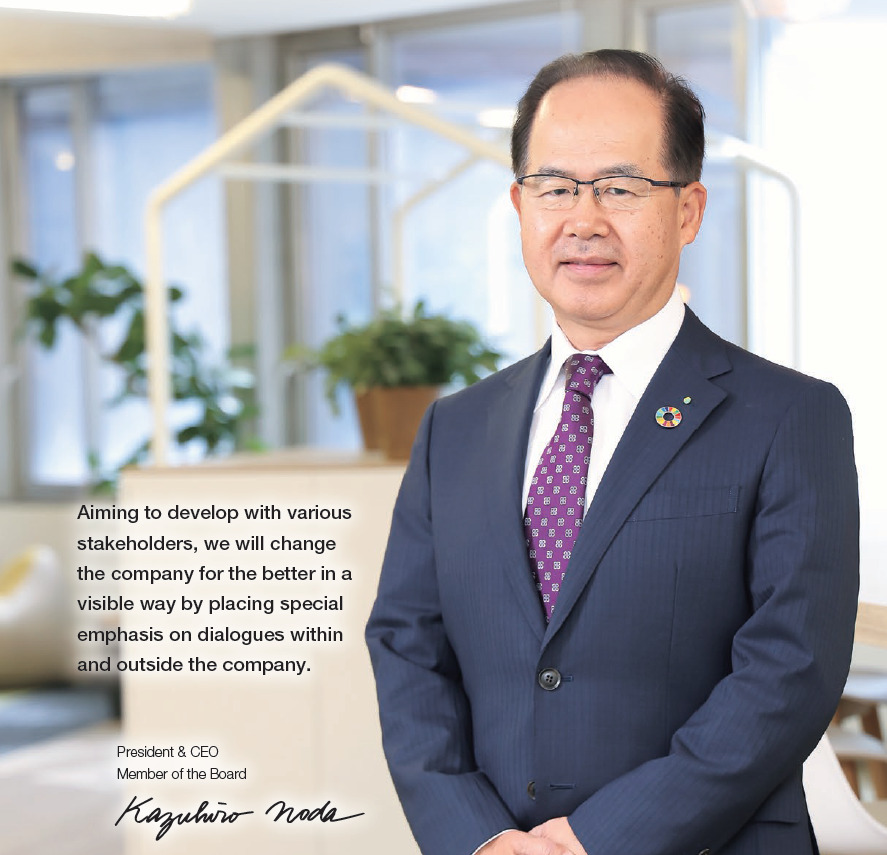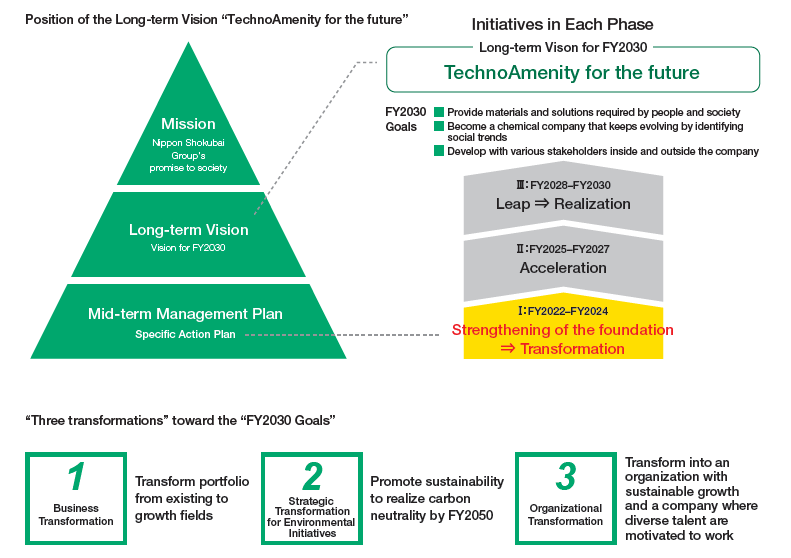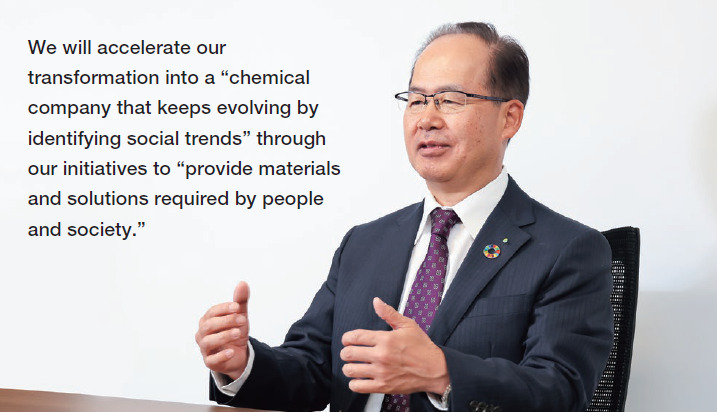Message from the President

Introduction
The Nippon Shokubai Group conducts business activities in pursuit of the fulfillment of its Mission: “TechnoAmenity: Providing Prosperity and Comfort to People and Society, with Our Unique Technology.” The Mission reflects our strong desire to contribute to creating a society where people can not only enjoy material affluence but also lead a comfortable life, physically and mentally, with hope for the future.
Since its founding in 1941, Nippon Shokubai has provided chemicals, including ethylene oxide (EO), acrylic acid (AA), and superabsorbent polymer (SAP), through the development of unique technologies. These chemicals have been used for detergents, fibers, disposable diapers, and other key products that are related to people’s comfortable and prosperous lives, leading to the realization of “TechnoAmenity” and the considerable growth of our company.
In recent years, however, the globalization and commoditization of these chemicals has heated up global low-cost competition, making our business environment severer than ever. Moreover, the functions required for products have become increasingly diverse, including environmental impact reduction. Furthermore, ESG activities toward the realization of a sustainable society, including initiatives to address climate change and other environmental issues, have become an essential factor for companies to survive.
In response to these situations, we have formulated the Longterm Vision “TechnoAmenity for the future,” which states our FY2030 goals. Toward the achievement of the goals, we have developed our Medium-term Management Plan “TechnoAmenity for the future-Ⅰ” and been promoting the plan, regarding FY2022 to FY2024 as Phase 1, when we strengthen the foundation for transformations and implement them.
FY2022, or the first year of the Medium-term Management Plan, saw dizzying changes in the economic environment, including the prolonged impact of the COVID pandemic; soaring prices of petroleum and other chemical materials as well as natural gas and other energies, triggered by the tense situation in Ukraine; and rapid currency exchange fluctuations in response to European and U.S. interest-rate policies.
Since the beginning of this year, thanks to the end of the COVID pandemic, positive signals have appeared on the horizon, including the revival of inbound tourism and the recovery of the Chinese economy. Meanwhile, a global economic setback is anticipated based on negative factors, including high energy prices caused by the prolonged situation in Ukraine; and the ailing economies of certain countries due to tight monetary policies (as of June 2023). Furthermore, consumption trends after the end of the COVID pandemic have changed from those before the pandemic, and a downturn in consumption caused by inflation seems to be unavoidable for the time being.
Amid such turbulence in our business environment, we still consider that the following “Three transformations,” outlined in the Long-term Vision and the Medium-term Management Plan, are essential for our sustainable growth and evolution: “Business Transformation,” “Strategic Transformation for Environmental Initiatives,” and “Organizational Transformation.” I believe that it is important to ultimately achieve our goals while flexibly modifying our strategies in the process in response to external changes. Therefore, while adhering to the direction and goals indicated in the Long-term Vision and the Medium-term Management Plan, we will advance our efforts, focusing on how we can achieve the goals.

FY2022 Overview
Business Transformation
Since FY2022, Nippon Shokubai’s businesses have been reorganized into two segments: Materials and Solutions. This reorganization is based on our intention to drastically rebuild our Materials business to strengthen our business foundation while expanding our Solutions business, which is highly profitable, to further increase profitability. We have set the business targets of achieving a sales ratio of 65:35 and an operating profit ratio of 50:50 between the Materials and Solutions businesses by FY2024. As for FY2022 results, the Materials business achieved a sales increase from the previous year but remained at the same level of operating profit, while the Solutions business achieved a sales increase but had in an operating profit decrease from the previous year. A decrease in sales volume had a significant impact on these results. As mentioned above, however, we will adhere to the goals and build a firm business foundation that is not susceptible to changes in market conditions.
The progress of the business plan is described as follows. Regarding the Materials business, the SAP Survival Project, which has been continued for the purpose of strengthening the profitability of AA and SAP, proceeded almost as well as planned. The EO Resilience Project, which started in FY2021 as a horizontal expansion of the SAP Survival Project, has been proceeding as planned, toward the achievement of the profitability improvement target for FY2024.
Regarding the Solutions business, we have invested human resources into our planning and sales organizations, and almost finished developing a platform that would become the key to strengthening our solution proposal capability. In FY2023, we will start full-fledged operation of this platform and promote the development themes that have been worked on as a company-wide project (“One Team” activities), accelerating the expansion of the Solutions business. Moreover, as one of the measures to improve profitability through expanded sales of strategic products, we have been promoting initiatives toward the business expansion of IONELTM, our electrolyte for lithium-ion batteries. Specifically, we will expand the business in China and Europe through alliance with partner companies, and grow it over the medium to long term based on this competitive advantage of local production for local consumption. This collaboration is based on our view that, amid the recent drastic changes in our business environment, we will not be able to gain sufficient competitiveness by doing business all by ourselves as we did before. We will continue to accelerate the business expansion of our strategic products while strengthening cooperation with our various external partners.
Strategic Transformation for Environmental Initiatives
Regarding climate change, in response to the full-scale implementation of CO2 emissions trading in the EU, Japan has begun to consider the introduction of carbon surcharge and emissions trading systems. Discussions are under way, mainly in the EU, on a carbon border adjustment mechanism for products imported from outside the region. Initiatives to reduce carbon emissions have been further accelerating toward the globally common goal of achieving carbon neutrality by 2050.
Initiatives to reduce greenhouse gas emissions
Nippon Shokubai has set the FY2030 goal of reducing greenhouse gas emissions from the company and its Group companies in Japan by 30% compared to FY2014. Two years ago, in FY2021, continued energy-conservation activities at our plant sites played a key role in emissions reduction compared to FY2014, but due to a production volume increase, emissions were reduced only by 2% compared to FY2014. However, Since FY2022, we have been promoting the use of carbon neutral city gas, which is equivalent to a reduction of approximately 7% in CO2 emissions, and combined with our existing energy-conservation activities, we have achieved a 14% reduction in CO2 emissions. Toward the achievement of the FY2030 goal, we will also promote process improvements and catalyst efficiency improvement.
Moreover, for the promotion of Group-wide CO2 emissions reduction, we have decided to introduce internal carbon pricing.
Achievement of carbon neutrality by 2050
Keeping an eye on the possibility of revising the FY2030 emissions reduction goal upward, we have been proceeding with the introduction of biomass materials. This fiscal year, we obtained ISCC PLUS certification for 19 items produced at the Himeji and Kawasaki Plants, including AA, SAP, and EO. With this certification, we have established a system of manufacturing and selling certified products to which biomass-derived materials are allocated in the mass balance system. Moreover, NSE, our subsidiary in Europe, has started to produce and supply ISCC PLUS-certified SAP.
We have also been engaged in the development of a new acrylic acid manufacturing process using 100% biomass derived from natural products and a joint study with other companies for manufacturing and marketing ethylene oxide derivatives using biomass raw materials.
We believe that these products, made from natural materials, will not only meet the needs of global environmental protection and environmental load reduction, but will also be indispensable to our further growth.
Diverse global environmental issues
Various countries are making progress in discussions about and specific requests for risk recognition and information disclosure regarding the sustainability of natural resources such as water resources and biodiversity in addition to climate change measures. We at the Nippon Shokubai Group disclose information on our water resource-related initiatives through the CDP (Carbon Disclosure Project). Furthermore, at the end of FY2022, we began to announce the results of surveys of biodiversity-related risks. We deal in products that contribute to the sustainability of water resources, including wastewater treatment catalysts and osmotic pressure generating agents for seawater desalination. While contributing to society with these products, we take these social issues as business opportunities for chemical companies like us, and we will promote the development of new environmental contribution products, leading it to our future growth.
Organizational Transformation
For the sustainable growth of a company, the growth of both individuals and organizations in the company is indispensable. We strive to develop a pleasant work environment and in-house systems, and make our company a place where diverse talents are motivated to work and where individuals and organizations can grow together. To be more specific, we have identified the following three issues and executed measures for them: the development and empowerment of human resources, organizational growth, and the strengthening of corporate governance.
Regarding the development and empowerment of human resources, we began to employ a new personnel system in FY2022. We have also developed “autonomous talents” and established systems that support diverse work styles and the empowerment of diverse talents.
Regarding organizational growth, we have implemented authority delegation for quicker decision making. We will continue to take measures to strengthen labor-management dialogue, including a system that allows employees to advance proposals to the management.
Regarding the strengthening of corporate governance, we have developed the management’s skill matrix to address increasingly complex and diverse issues. In FY2022, we introduced a performance-linked stock compensation plan to encourage board members to contribute to enhancing our medium- to long-term business performance and increasing our corporate value. Through the implementation and improvement of related measures, we will continue to pursue corporate governance that will lead to our corporate growth.
In order to promote and strengthen these measures, we also conducted an engagement survey and began to use this system on a regular basis. In the FY2022 engagement survey, employees suggested that there was room for improvement in “growth potential and future prospects of businesses” and “confidence in the management.” We consider these suggestions as the matters we should improve in order to promote the Medium-term Management Plan, and we will make continuous initiatives toward the transformation.
In the previous fiscal year, we developed corporate systems for Organizational Transformation. We consider Organizational Transformation a key matter that affects the possibility of our success in Business Transformation and Strategic Transformation for Environmental Initiatives in the medium to long term.
Promotion of a Digital Transformation
In FY2022, to advance the “Three transformations,” we accelerated the promotion of digital transformation (DX). We began to give all employees DX training in order to help them understand what we pursue through DX and to provide them with basic knowledge in using digital technologies. We also proceeded with the introduction of a platform that strengthens our solution proposal capability and a system that supports the integration and full use of information.
We focus particularly on initiatives led by the Production Division for the consolidate management of plant information and the optimization of production plans. We will start with tangible improvements, including a significant reduction in the time spent searching for information and developing plans, and then we will explore the possibility of predictive maintenance and energy conservation.
While the use of digital technologies will become an increasingly important means of supporting our transformations, we believe that we cannot maximize the effect of using digital technologies if we rely only on a fraction of our human resources who are experts in the field. We will continue to enrich company-wide training to secure the human resources we need to promote DX.
Conclusion
Setting the three years from FY2022 to FY2024 as a period of strengthening the foundation for transformations and implementing them, we are steadily stepping up our initiatives for the transformations. Meanwhile, the external environment is constantly changing irrespective of our pace of taking measures. As outlined in the FY2030 goals, we will accelerate our transformation into a “chemical company that keeps evolving by identifying social trends” through our initiatives to “provide materials and solutions required by people and society.”
Regarding the transformations, aiming to “develop with various stakeholders inside and outside the company,” we will change the company for the better in a visible way by placing special emphasis on dialogues within and outside the company and actively adopting various suggestions. We will also contribute to the realization of a sustainable society through collaborations with all stakeholders.
Under the Safety Philosophy “Safety takes priority over production,” we will continue to promote safe and stable production activities, taking special notice of the responsibilities we should fulfill, including those for contributing to the peaceful lives of local community residents, ensuring stable product supply to customers, and maintaining a safe working environment for our employees.
